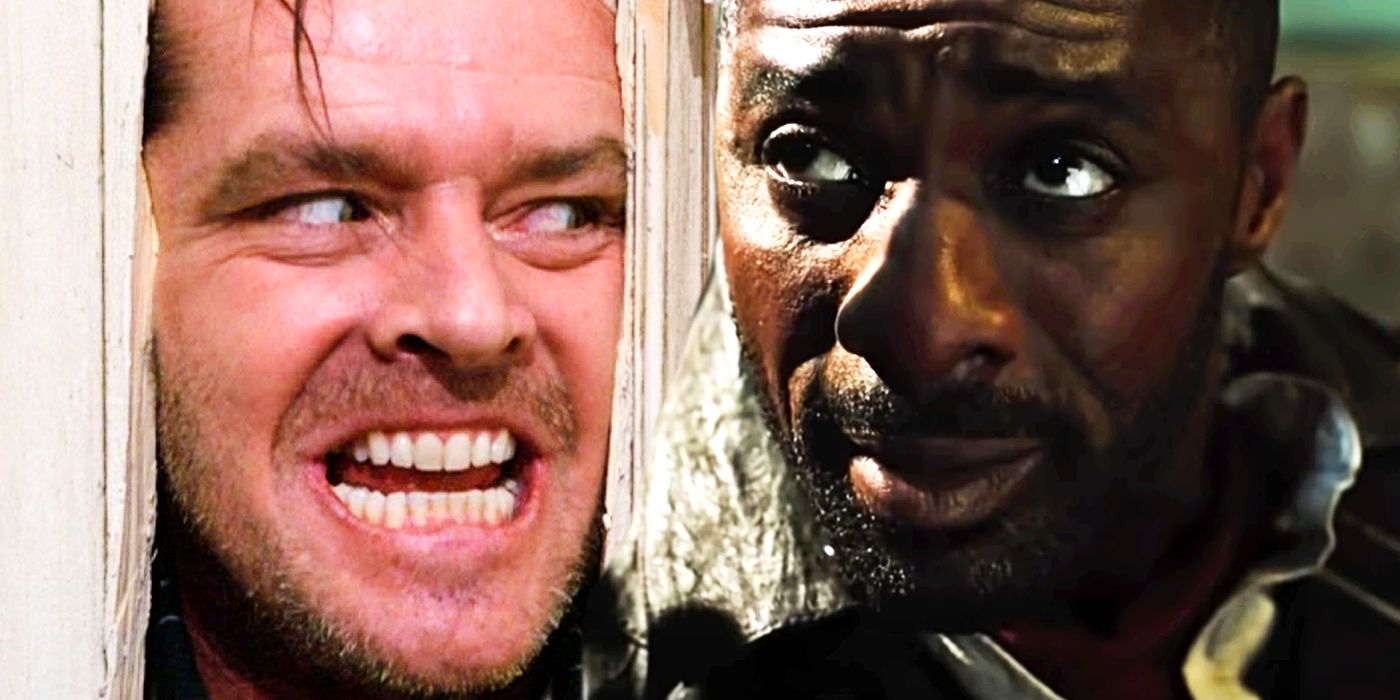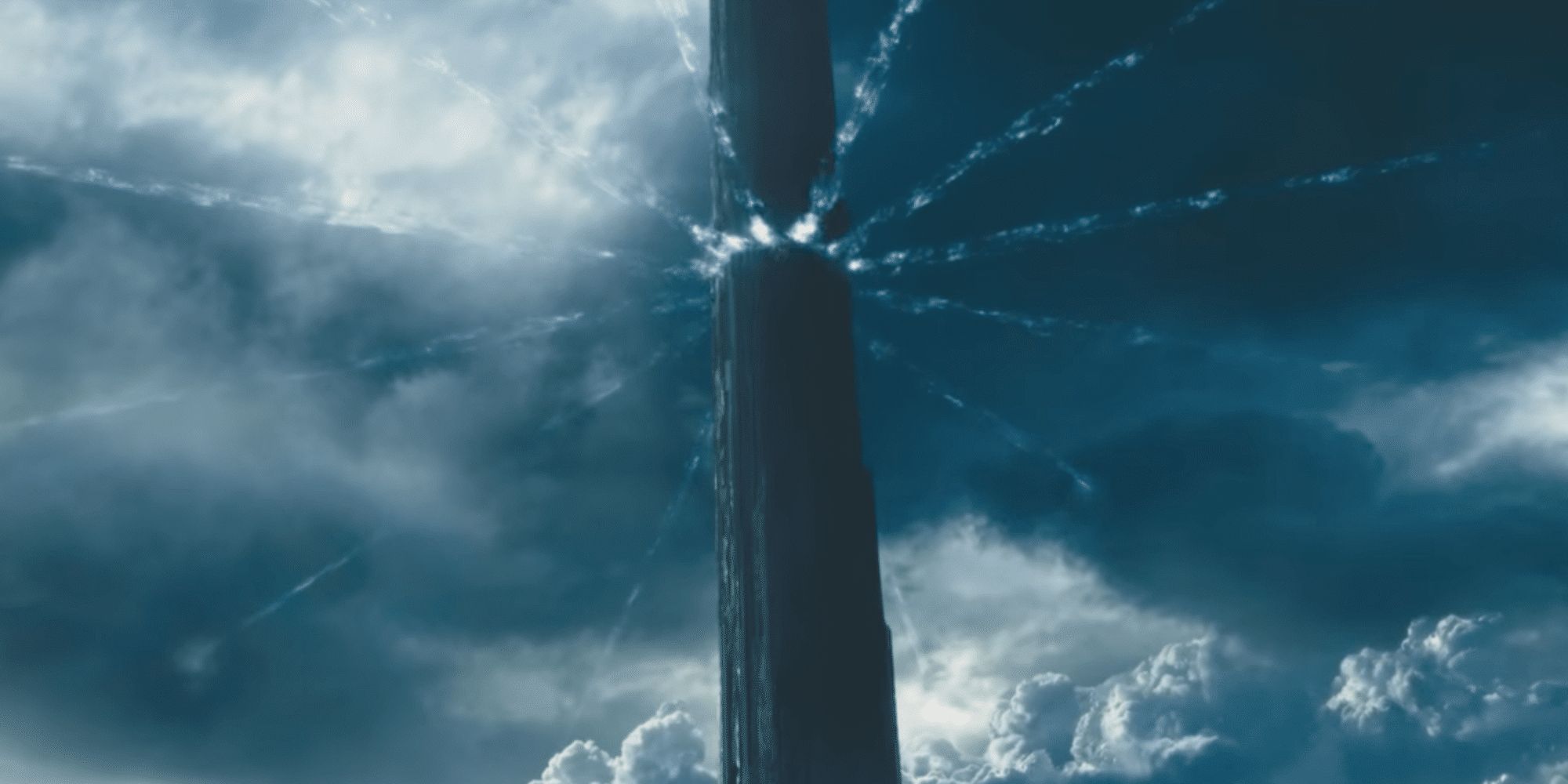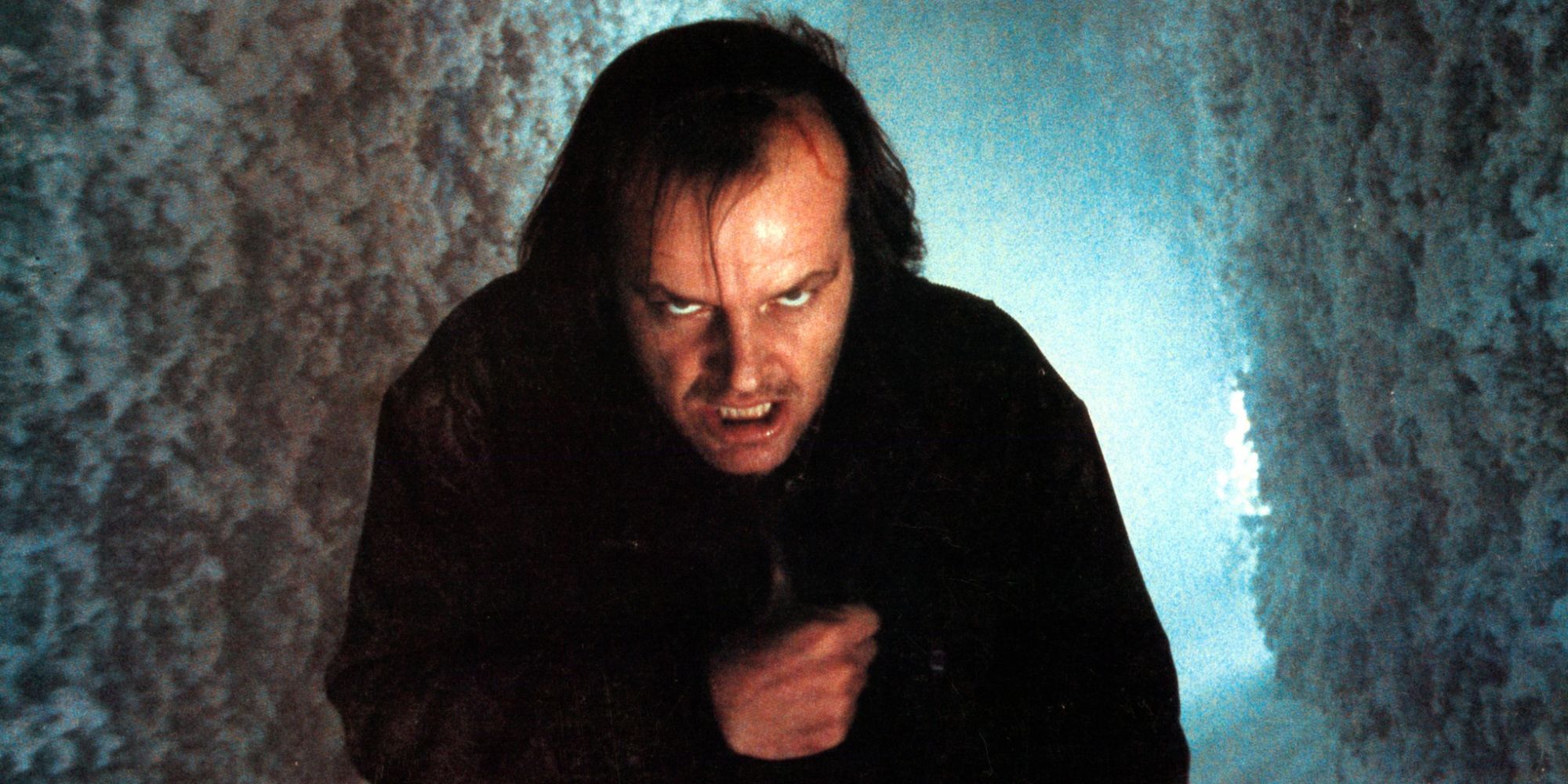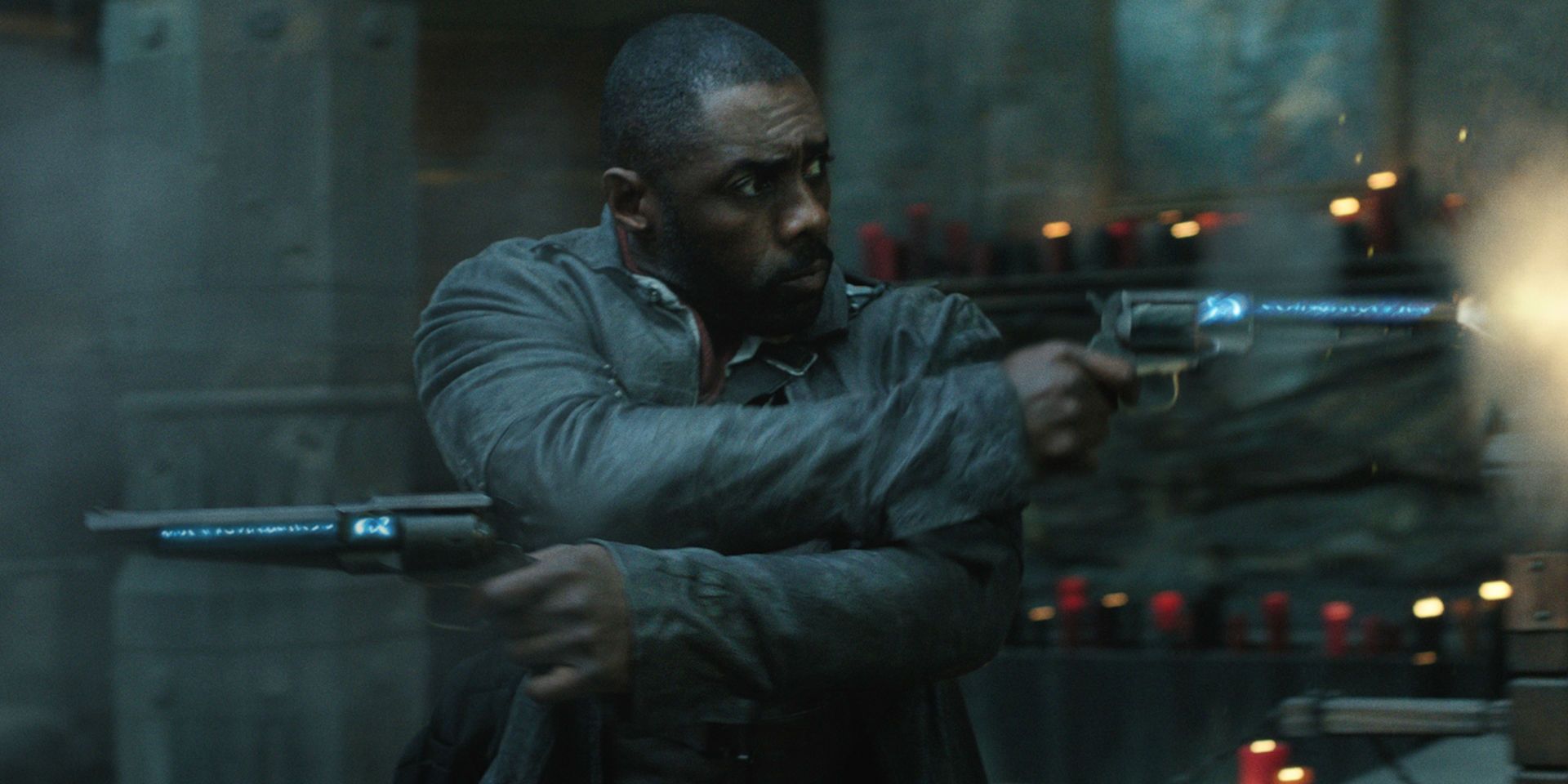Both The Shining and The Dark Tower made substantial changes from the Stephen King novels they were based on, but why did only the former succeed in doing so? As one of the most prolific novelists in 20th and 21st centuries, the works of Stephen King have been adapted to film countless times, frequently as television mini-series. Stanley Kubrick's 1980 adaptation of King's novel The Shining, is perhaps one of the most well known of these - but it's also one that King was notoriously unhappy with.
The Shining retains the core of King's novel of Jack Torrance (Jack Nicholson) becoming the winter caretaker for the Overlook Hotel and eventually going insane at the prodding of ghosts haunting the Overlook. However, Kubrick's film significantly re-invents the story, with Jack himself having a much more villainous portrayal. King's dissatisfaction with The Shining was such that he later wrote and produced The Shining mini-series on ABC in 1997, which was a much closer adaptation of his novel.
Adaptations of Stephen King novels have certainly had their shares of misses, but many cite The Dark Tower as one of the biggest such letdowns. Like The Shining, The Dark Tower takes liberties with the novel series it derives from, but the reception of the two couldn't be more different. The Dark Tower is one of the more derided Stephen King movies in recent memory, with even producers Ron Howard and Akiva Goldsman, who also co-wrote the film, having expressed disappointment in the final product. In stark contrast, Kubrik's version of The Shining is one of the most acclaimed horror movies ever made. This begs the question as to how one succeeded in re-molding the story it was based on while the other didn't, and a few factors help explain why.
The Dark Tower Is A Pillar (Literally & Figuratively) To Stephen King's Universe
In the popular modern landscape of cinematic universes, The Dark Tower had everything in its tool box to gain a massively positive reception. The Dark Tower series isn't simply one set of Stephen King novels among many, but the very foundation that literary universe sits on. The books even make this literal, with the Dark Tower itself being a pillar that all of existence rests upon. To be sure, there were never realistic expectations for The Dark Tower to cross over with most other King adaptations, the film rights being sprinkled across different studios. Nonetheless, the potential for the kinds of stories The Dark Tower could set up was vast, making it that much more frustrating when the movie dropped the ball like it did.
The Shining isn't a King story of similar grandiosity. In many ways, The Shining is the inverse of The Dark Tower, telling a much more closed-off story in the Overlook. Moreover, Jack's history of alcoholism and violent behavior leaves him practically set up to go mad in the isolation of the Overlook. Kubrick's film takes the different tract from King's novel, showing Jack needing only a few light nudges from the Overlook to lose his mind. However, with the smaller scale of The Shining's story, the lost potential wasn't felt in the film's changes as was the case with The Dark Tower, which was literally universe-spanning in its case. Additionally, while The Shining took Jack down a different path from the novel, it was one that still made plenty of sense for him.
The Shining's Portrayal Of Jack Is A Departure, But Follows A Logical Path
Among the changes Kubrick made to The Shining, the film's portrayal of Jack Torrance especially stands out. In the novel, Jack's struggle with beating his alcoholism and writing a novel made him a tragic and sympathetic protagonist. Jack's story was also partially autobiographical to King's own battle with drug and alcohol addiction at the time. When it came to The Shining movie, casting Jack Nicholson as Jack Torrance sent a clear signal that the character would have a more psychotic and sinister portrayal.
In Kubrick's movie, the empathy afforded to Jack in the novel is completely gone, with the film portraying him as a much more domineering and unstable husband and father. While this lost Jack's heartfelt arc in King's novel, it also didn't take Jack into an illogical alternative destination. In the film, Jack has an at-best dysfunctional marriage with Wendy (Shelley Duvall). Despite his vow of sobriety, it doesn't take long for him to fall off the wagon when things become tense. Jack's arcs in both The Shining novel and The Shining movie helmed by Kubrick were each an equally likely outcome for him with his history with alcohol abuse and violent impulses. Kubrick's film may have taken Jack off-course from where King did. Still, Jack's even darker tale in the former still works logically as simply an option B for how his time as the Overlook's winter caretaker could've gone.
The Dark Tower As A General Movie Doesn't Rise To The Shining's Level
When it comes to overall storytelling, The Shining is simply a far better movie than The Dark Tower. Of course, it must be emphasized that the general quality of either doesn't inherently derive from their faithfulness, or lack thereof, to King's novels. That said, the story each one tells highlights where their changes from the source material functioned to either help or hurt them. In the case of The Shining, on top of other alterations like the death of Dick Hallorann (Scatman Crothers), Kubrick's movie changes Jack's arc from a struggling man being pushed over the edge to a violent sociopath finally being let off the leash. With that being the goal of The Shining, it's quite successful in telling a genuinely terrifying horror tale of a family isolated in a snowed-in hotel as their husband and father becomes the monster he was all along.
In the case of The Dark Tower, its storytelling choices hobbled it at every turn. As a would-be franchise starter that acts as a follow-up to eight Dark Tower novels, and compressing so much mythos into 95 minutes, The Dark Tower was already setting its ambitions far too high. This also brought into focus how ill-advised the film's portrayal of Roland was. With so much of The Dark Tower novels already getting the cliff notes treatment, Roland was stripped down to a man on a revenge mission, with his connection to the Dark Tower taking a backseat. The mistake of The Dark Tower was that Roland's portrayal offered nothing as compelling as his gunslinger backstory in the novels. Elba's energetic performance notwithstanding, The Dark Tower took too much of what made Roland a great character off the table, with the portrayal it offered feeling like a major downgrade.
Changes in an adapted work from the source material aren't an inherently bad thing. Frequently, they're even necessary for the transition from one medium to another, and as 1998's Blade shows, can even result in the altered version outdoing what came before. Even bearing that in mind, The Dark Tower's changes left the film as a whole a stripped down, scaled back, and undercooked take on one of Stephen King's most layered and complex literary works. The Shining worked more as the Stephen King equivalent of an episode of Marvel's What If...? in its very different portrayal of Jack. Where to makes changes and what to change are always loaded questions for any adaptation to consider. In the end, The Shining provided a much better answer than The Dark Tower did.




